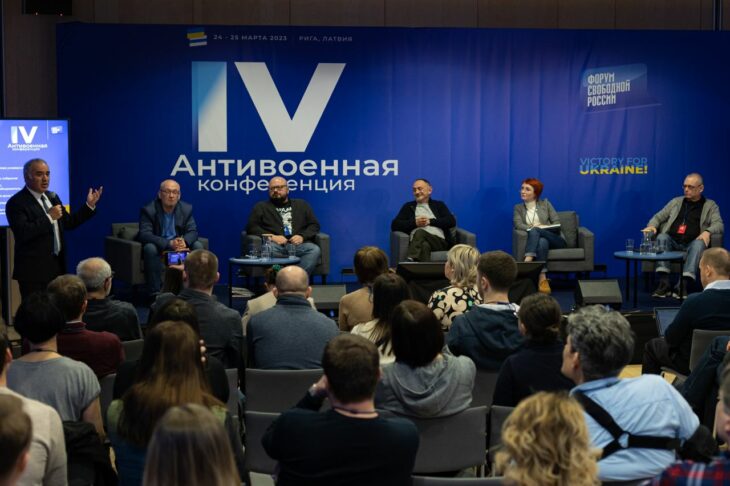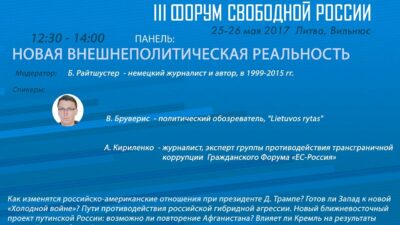The Free Russia Forum held its 4th Anti-War Conference in Riga

Unprecedented – more than 200, and only in the first days of registration! – number of applications for participation. Several dozen accredited media from different European countries. And a special address by former British Prime Minister Liz Truss, who assured attendees that she fully supported their initiatives. So on March 24-25, the Latvian capital Riga hosted the 4th Anti-War Conference, organized by the Free Russia Forum, the largest official structure of the Russian opposition.
Participants included co-founders of the Forum for Free Russia Garry Kasparov and Ivan Tyutrin, British parliamentarian Alicia Kearns, former U.S. State Department sanctions coordinator Daniel Fried, Lithuanian Deputy Foreign Minister Mantas Adomenas, Latvian diplomat and former Latvian Ambassador to Russia Maris Riekstins, European parliamentarian Ivars Iyabs, and Russian opposition activists Gennady Gudkov, Evgeny Chichvarkin, Dmitry Gudkov, and Maksim Reznik, publicists Alfred Koch and Alexander Morozov, gallerist Marat Gelman, journalists Igor Yakovenko, Yevgeny Kiselev, Andrei Arkhangelsky, Yan Levchenko, economist Vladislav Inozemtsev, lawyers Yelena Lukyanova, Natalia Pelevina, Daniil Konstantinov, social activists Yevgeniya Chirikova and Anastasia Shevchenko, political scientists Dmitry Oreshkin and Mikhail Savva, Ukrainian Armed Forces officer Taras Berezovets, Ukrainian MP Oleg Dunda and many others.
The main thesis of the conference can safely be called “Victory to Ukraine, freedom to Russia!” because no one doubted that the Ukrainian victory and the collapse of Putin’s dictatorship in Russia are interrelated.
“There is not just a regional or continental war going on in Ukraine, it is a war for a new world order”, said Garry Kasparov, “the war is between Freedom and tyranny. Ukraine is defending the entire Free World, and the entire Free World is on its side. This is our war, and we must do everything to win it”.
“Kashchey’s death is suspended in a flask somewhere in the headquarters of the Russian troops in Sevastopol”, says businessman and volunteer Yevgeny Chichvarkin, “we need to contribute as much as possible so that the AFU can get there quickly. How exactly? Well, for example, to contribute to an armored car and send it to the Ukrainian army. Which, in fact, we have been doing since last March…”.
Political analyst Dmitry Oreshkin believes that Putin’s Russia has already lost: “It has failed as a form of civilization. Since Putin went to war with Ukraine, it means that he could not offer it a more attractive project than the West. They didn’t want NATO expansion – here is NATO expansion for you. Is that a victory? That’s also a defeat. Only not yet realized. The Russian world has become toxic. It’s a shame to speak Russian – maybe this is Putin’s great victory?.. The key to the Russia of the future is in the hands of Ukraine, whether Ukrainians like it or not. Without a conscious defeat on the battlefield, the Russia of the future is impossible.
Putin’s real defeat will be the loss of Crimea. But the inability to take Bakhmut already undermines his credibility”.
The conference participants also discussed other important issues related to Russian aggression in Ukraine and the crime of Putin’s regime. For example, what is Z-ideology and is it an ideology?
According to culturologist Yan Levchenko, Z is a sign that usually crosses out a blank spot on a piece of paper, so Z-ideology is the ideology of a blank spot. And his colleague Andrei Arkhangelsky considers Putin’s Z-bashing to be “the ideology of communal envy, raised to the absolute: piss in your neighbor’s soup! That’s it! The Kremlin has no other ideology”.
“A far greater crime than a riot policeman beating up a protester is committed by a teacher at a school who destroys a child’s soul with his Z-ideology”, says politician Maksim Reznik.
Why was a full-scale invasion of Ukraine even possible?
According to the publicist (former Russian Deputy Prime Minister) Alfred Koch, “Putin was a bride-to-be wooed by two grooms, the United States and China. And he thought that in such a bargain, he had the right to “little pranks. Like, “I want to attack Ukraine, and what will you do to me, if you need me?”.
What punishment do war criminals deserve, will there be a special tribunal and collective responsibility for all Russians?
The issue of punishing all those responsible will not disappear from the agenda as long as the state of Ukraine exists, says human rights activist Daniil Konstantinov, head of the “Putin’s List” project.
“The most eerie impression on me was when I visited the Izyum forest, where 500 dead were exhumed in the first days alone”, confessed political scientist and AFU officer Taras Berezovets. “When you see bodies of military men shot dead like those of the NKVD, with bullets in the back of the head, with hands twisted behind their backs with belts and wires, and the mutilated bodies of Ukrainian civilians tortured only because someone informed on them… This is a terrible place where thousands of Russians will have to come to see with their own eyes the consequences of Putin’s genocidal policy applied in Ukraine. Just like in Mariupol, where the bodies of those killed are still not buried. They are simply demolished with their houses destroyed…”.
What sanctions should the West impose on Putin’s Russia?
British politician Alicia Kearns sees sanctions as a tool not only for punishment, but also for influencing future behavior, while Russian-American economist Vladislav Inozemtsev believes that Russia should be deprived, first of all, not even of money, but of access to technology and high-tech products that it can use in its military industrial complex.
Should the assets of Russian oligarchs be frozen?
“Russia is a medieval state: today you are an oligarch, and tomorrow you are already sitting in jail and your billions have been confiscated,” says investigative journalist Anastasia Kirilenko, “so it is necessary to freeze the oligarchs’ money! After all, at any moment they can be taken away by Putin and used for war”.
Another issue of no little importance was the idea of uniting the Russian opposition on the basis of common principles. Something that, alas, has not yet been achieved.
After February 24, 2022, we have made a huge step forward,” said Ivan Tyutrin, co-founder of the Forum of Free Russia. “Because after the annexation of Crimea, in 2014, the Russian opposition could not unite. We could talk together, but we could not articulate a common position because the two opposition groups did not clearly articulate their position on Crimea. The Free Russia Forum was the only structure that clearly stated that the return of Crimea to Ukraine was a necessary condition for Russia to become a democratic country that would be part of the free world. After February 24, all leading Russian opposition groups adopted the same position. Now, if you look at their programmatic theses, you’ll see: they are very close to what the Forum participants have been discussing for a long time. This gave us a serious basis to work together. And this work began almost immediately after Putin’s full-scale invasion of Ukraine. The Russian Action Committee was created, the Anti-War Committee, and, by and large, I think there hasn’t been this level of consolidation of the Russian opposition for a very long time, maybe even since 2011”.
The discussions between conference speakers and interested members of the public and the media can be seen on the Free Russia Forum’s YouTube channel: there you can watch the broadcast of the 4th Anti-war Conference. By the way, for the first time it was not held in Vilnius, where the FRF has been based since 2016.
It is quite possible that the fifth conference will also be held in the capital of another European state – Paris, Berlin or Brussels, where the Forum will soon open a representative office. The demand for such events is obvious.





